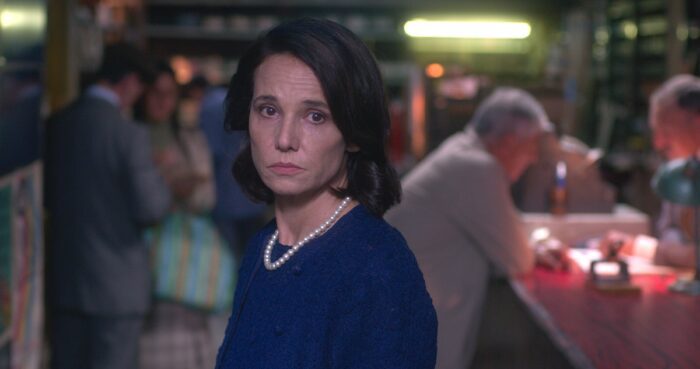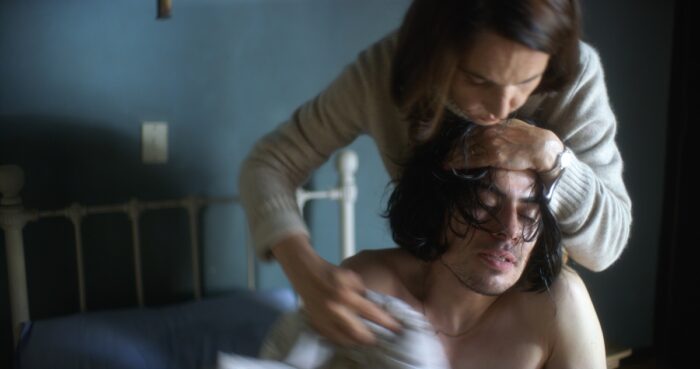Fresh from a successful international festival run, including last fall’s BFI London Film Festival where it won Best First Feature award (as 1976), director-writer Manuela Martelli’s subtly swirling political noir thriller Chile ’76 debuts theatrically this week in North America. A stylish, guarded tale of a woman’s tentative first foray into political resistance, Chile ’76 employs a fresh perspective on the oppression of the Pinochet regime through its carefully drawn protagonist, sophisticated visual design, and haunting score.
Chile ’76 opens with a close-up of paint being mixed to the satisfaction of an upper-middle-class woman, the smartly dressed and seemingly perfectly poised Carmen (Aline Kuppenheim). Outside the shop, muffled sounds of a struggle and a woman’s cry can be heard. When a drip from the pinkish container stains her stylish blue shoe, the camera lingers in a slow close-up. The scene suggests both that Martelli is, even in her debut production as a director, a confident, bold, visual storyteller and that Carmen is about to enter a world that will complicate—stain, perhaps—her staid, stylish existence. Outside, she finds another shoe: an unfashionable brown flat, stained with grime and dirt from wear, perhaps that of a woman abducted while Carmen was paint-shopping. It’s not going to be Carmen’s first encounter with the violence that accompanies political resistance.
Most of Carmen’s time is dedicated to paint hues and interior design. She’s supervising renovations on her summer off-season house near the beach. Her own children are fully grown with kids of their own who visit; her husband Miguel (Alejandro Goic) is pleasant, but aside from updates on renovation progress, barely interested in her existence. To engage herself with a world outside her paint hues and renovations, Carmen’s taken to volunteer work: reading literature to the blind and aged, work that brings her in regular contact with her priest, Padre Sacnhez (Hugo Medina).

That paint splotch was an intimation that soon worlds will get mixed in unpredictable ways. The priest asks Carmen to take care of an injured young man (Elias, played by Nicolás Sepúlveda) he has been sheltering. At first doing so seems a simple matter of securing enough penicillin and antibiotics to heal his wounds. But as he heals, the arrangement becomes more complicated, and eventually, his safety must be secured—with Carmen’s help.
Delivering him to the safety of the opposition draws Carmen inadvertently into a world of political resistance and dangerous loyalties where her presence—a keenly dressed, carefully mannered upper-middle-class woman out of place in the Chilean barrios—will be questioned and made uncomfortable. Even a simple hot-dog-and-Coke in a local cafe is fraught with tension.

Carmen isn’t the type to develop a vocal conscience and lead a revolution, but her lifestyle has become a tedious, perhaps even meaningless pageant of style choices, and this one small act might give her existence some deeper purpose. With no one other than Padre Sanchez and Elias to confide in and a series of clandestine maneuvers to carry out, Carmen faces threats she is scarcely prepared to handle—and eventually, the potentially disastrous consequences of her decisions come to light for both her and for her entire family.
Although the plot of Chile ’76 might register as a mainstream political thriller, the kind of conspiracy actioner made famous in the decade Martelli’s story takes place, there’s nothing generic about its presentation. While Carmen takes on a dangerous mission or three, Chile ’76 doesn’t present itself as standard thriller chase-and-challenge fare. It evokes its suspense and tension through carefully guarded conversations where each simple utterance carries an ominous double entendre.
Shot in a Kodachrome-evocative palette that emphasizes the stylish colors of the era and a visual design highlighting Carmen’s aesthetic renovations and sartorial chic, Chile ’76 reads almost like a Douglas Sirk melodrama turned Hitchcockian identity thriller, the evocative cinematography by Yarará Rodríguez taking care to present Carmen’s own deliberate risk-taking and choice-making. Art director Francisca Correa, costume designer Pilar Calderón, and producer Omar Zúñiga deserve special mention for their meticulous re-creation of the time, place, and social caste of Carmen’s world, especially her elaborate wardrobe and the evocative set design. Mariá Portugal’s curious score pulses and throbs with a tinge of horror as it imbues even innocuous images and actions with a disturbing sense of foreboding.
In this sense, Chile ’76 is one of a number of recent international films playing with, but refusing to yield to, the generic tropes of the espionage thriller: Full Time, Pacifiction, Dry Ground Burning, Tori and Lokita, Rodeo, La Civil, Cadejo Blanco. Rather than kowtow to conventional expectations for big revelations and climactic chase scenes, Martelli—herself an experienced actress with a long resume—keeps the focus on Carmen as a character, with an ending that emphasizes the cost of keeping together a home and family. There is a price for Carmen to pay, and the film’s last scene suggests that more than anything else, even a woman with a newfound political conscience is still one with deep obligations to her home and family.
And there is where Chile ’76 shines: in using the thriller genre not just to offer up another conventional action film but to rework its tropes to convey the sacrifices those caught up in an oppressive regime must suffer. In this film, born from Martelli’s contemplation of a maternal grandmother she never met, it’s women who suffer the burden of oppression, and Carmen’s acute pain is made all the more evident by the straitjacket of her fashionable lifestyle while lives and freedoms are lost on the streets of Chile, 1976.
Written and directed by Manuela Martelli, co-written by Alejandra Moffat and starring Aline Kuppenheim, Chile ’76 (1976) opens May 5 in New York City and May 19 in Los Angeles, followed by national expansion. Chile/Argentina/Qatar, 2022, 95 min. In Spanish with English subtitles.



